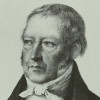“ When thought grows hopeless of ever achieving, by its own means, the solution of the contradiction which it has by its own action brought upon itself, it turns back to those solutions of the question with which the mind had learned to pacify itself in some of its other modes and forms. ”
Georg Wilhelm Friedrich Hegel, Science of Logic (1816). copy citation
| Author | Georg Wilhelm Friedrich Hegel |
|---|---|
| Source | Science of Logic |
| Topic | contradiction action |
| Date | 1816 |
| Language | English |
| Reference | |
| Note | Translated by William Wallace |
| Weblink | http://www.gutenberg.org/files/55108/55108-h/55108-h.htm |
Context
“That craving expresses the perseverance of thought, which continues true to itself, even in this conscious loss of its native rest and independence, 'that it may overcome' and work out in itself the solution of its own contradictions.
To see that thought in its very nature is dialectical, and that, as understanding, it must fall into contradiction, [Pg 19] —the negative of itself, will form one of the main lessons of logic. When thought grows hopeless of ever achieving, by its own means, the solution of the contradiction which it has by its own action brought upon itself, it turns back to those solutions of the question with which the mind had learned to pacify itself in some of its other modes and forms. Unfortunately, however, the retreat of thought has led it, as Plato noticed even in his time, to a very uncalled-for hatred of reason (misology) ; and it then takes up against its own endeavours that hostile attitude of which an example is seen in the doctrine that 'immediate' knowledge, as it is called, is the exclusive form in which we become cognisant of truth.”
source


